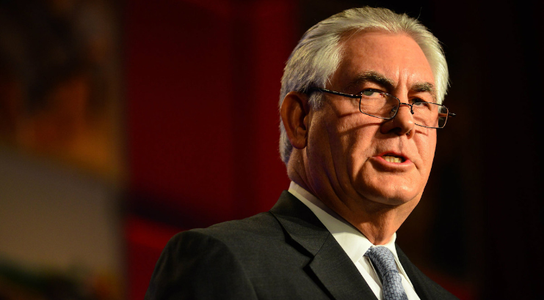Withdrawal Follows Trend by Trump Administration to Dismantle Programs Promoting Transparency, Accountability and Environmental Protection
The U.S. Department of Interior announced today that the U.S. will withdraw from implementing the Extractive Industries Transparency Initiative (EITI), a multi-stakeholder global anti-corruption program for the oil, gas and mining sector. As one of the organizations instrumental to the creation of the EITI, Global Witness strongly opposes the U.S. retreat from this important initiative, and the signal it will send to other countries and companies.
The move was an inevitable result of the insistence of major U.S. oil companies ExxonMobil and Chevron on keeping their U.S. tax payments secret. In addition, earlier this year, these companies led the attack on a related U.S. regulation that required extractive companies to publish their payments to governments around the world.
“We strongly dispute the U.S. government’s claim that U.S. laws prevent compliance with the EITI standard when it is Exxon and Chevron’s preference for secrecy that made it impossible for the U.S. to comply,” said Corinna Gilfillan, Head of U.S. Office at Global Witness. “When major Russian and Chinese oil companies are disclosing more information about their deals around the world than their U.S. counterparts, you have got to ask: what are Exxon and Chevron so desperate to hide?”
The United States, once a pioneer of international transparency, was the first country to enact an extractive payment transparency law in 2010, known as the bipartisan Cardin-Lugar Amendment or Section 1504 of the Dodd-Frank Act. That law, which inspired thirty other countries to follow suit, remains in force, but has yet to be implemented after years of delays caused by aggressive litigation and lobbying by the American Petroleum Institute.
Corruption in the natural resources sector is not only a moral issue: it is also an issue of national security importance. “More corruption means more conflicts around the globe, including in EITI countries like Iraq, Afghanistan and Yemen where American troops are stationed. By choosing not to implement the requirements of the EITI, the U.S. will send a message to other EITI members that they, too, can opt out of it, which would increase the potential for conflict and put U.S. troops at risk,” said Gilfillan.
/ ENDS
Contacts
You might also like
-
Press release U.S. Congress votes for corruption by overturning historic transparency law in gift to big oil
Today’s decision by the Republican-led U.S. Senate to overturn a rule designed to stop oil companies striking corrupt deals with foreign governments is a grave threat to U.S. national security and an astonishing gift to big oil.
-
Blog post From secrecy to conflicts of interest: Rex Tillerson fails his six-month performance review
This week marks six months of former ExxonMobil CEO Rex Tillerson’s tenure as US Secretary of State – the person leading America’s foreign policy. So how well is he performing in his new job? 181 days in, there’s more cause for alarm than praise.
-
Briefing Revenue disclosure laws – Cardin-Lugar and the global transparency standard
Global movement to end the corruption that blights resource-rich countries is gathering pace.